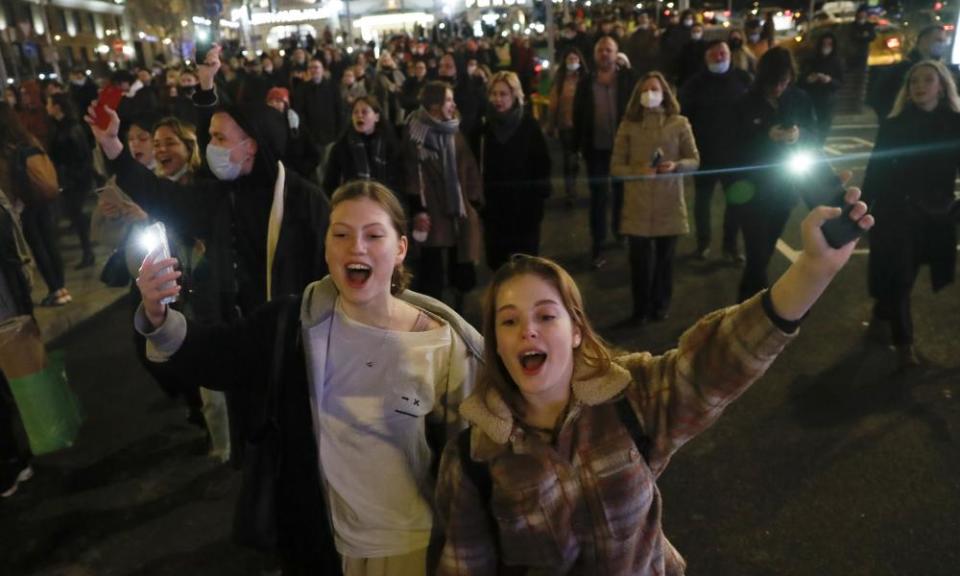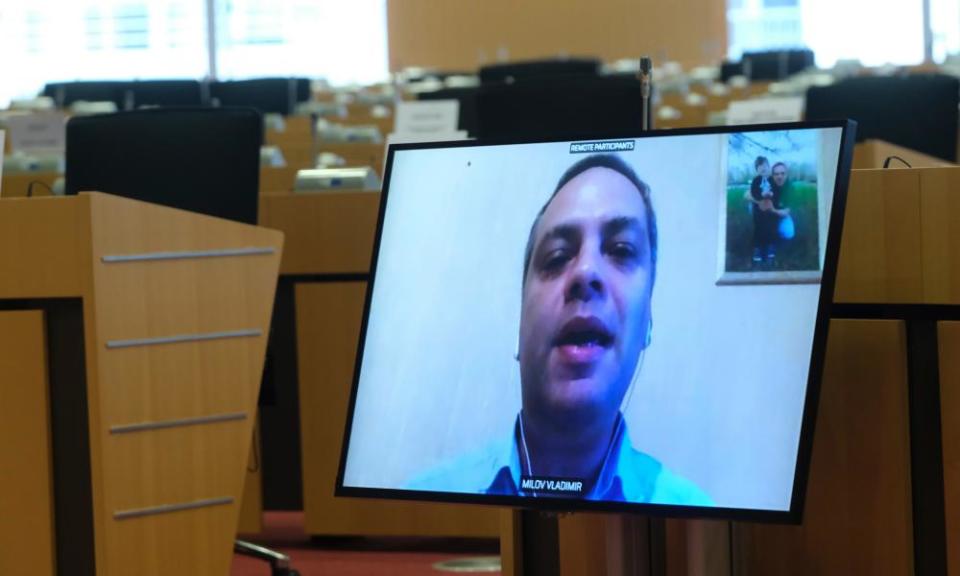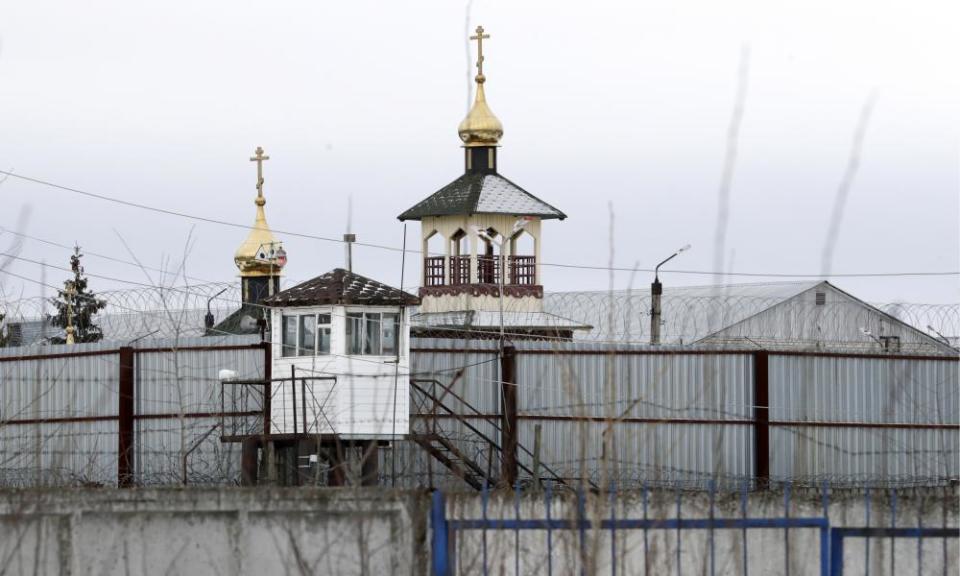‘It’s about surviving’: where next for Russia’s beleaguered opposition?
The future looked unspeakably grim for Alexei Navalny’s supporters before this week’s protests. Their charismatic leader was in prison and by his doctors’ accounts near death while the Kremlin was threatening to outlaw his entire movement. Sensing a looming apocalypse, one aide dubbed the protest: “The final battle between normal people and absolute evil.”
What followed was surprisingly normal: a core of tens of thousands of Navalny supporters rallied near the Kremlin, waving mobile phone torches and chanting “Putin is a thief!” The police stood back in Moscow (there was a violent crackdown in St Petersburg). For an evening, the crowd roved the streets of the capital at will.
“This feeling of enthusiasm, of overcoming fear, the protest ended on a positive note … It left me with the feeling that nothing is lost, it’s still not the final battle, and that street protests in Russia are not over forever,” said Ivan Zhdanov, the head of Navalny’s Anti-Corruption Foundation, in an interview from Europe.

But it is unlikely the euphoria can last. Navalny, who on Friday announced the end of his hunger strike after more than three weeks, will probably be behind bars for years to come. His aides are either in exile or under house arrest. And a court on Monday may label his movement extremist, threatening his supporters with the same punishments as those handed down to members of banned organisations such as Islamic State.
For the first time since Vladimir Putin became Russia’s president in 2000, the democratic opposition is on the verge of being driven underground, toward a reality that looks more like neighbouring Belarus.
“For the opposition it really is about surviving now,” said Prof Samuel Greene, director of the Russia Institute at King’s College London. “If we do get to a position where everyone who matters is in exile or in jail, then it becomes not about what the leadership does, but what ordinary people do. Do you get to a point where people are so fed up and scared about where things are going that you have a massive outpouring of dissent?”
Over the past decade, Navalny succeeded in a way that had eluded previous opposition politicians. He became a genuine national figure, reviled by the Kremlin and Putin personally but recognised too by the bulk of ordinary Russians. He has also been an indefatigable organiser, inspiring a generation of supporters to persist despite increasingly dire odds.
“There will always be protest, whether Navalny is free or he is not,” said Irina Yusupova, a high school student at Wednesday’s protest, when asked about the movement’s future. “Even if [they call us extremist], I will find a way to protest.”
There is no obvious stand-in for Navalny. Many high-profile anti-Putin campaigners have been forced into exile or killed. This week Vladimir Milov, – a close colleague of Boris Nemtsov’s, the opposition leader shot dead in 2015 outside the Kremlin – announced he had left for Europe to avoid arrest.

He joins Navalny’s senior colleagues Leonid Volkov and Zhdanov, who have already fled abroad to avoid imprisonment. Other allies such as Vladimir Ashurkov are based in London, which is also home to some of the journalists behind Navalny’s blockbuster investigations.
The Kremlin came close to murdering Navalny last summer, when an undercover team from the FSB spy agency poisoned him with novichok in Siberia. While Navalny was in a coma in a Russian hospital, Putin took the decision to allow him to leave the country and to receive medical treatment in Germany. The president’s apparent calculation: Navalny wouldn’t return.
The strategy was an old one. In the 1970s KGB chief Yuri Andropov realised that the most effective way to silence and to render irrelevant troublesome dissidents was to dump them in the west. The Soviet Union expelled many of the country’s most prominent writers and intellectuals, including the Nobel prize-winning author Aleksandr Solzhenitsyn and the physicist Yuri Orlov.
Navalny was different, though. A lawyer by training, he brushed off the argument from some of his nervous aides that he might stay in Germany – at least for a little longer. In January, he flew back to Moscow, knowing he would be immediately arrested. It was an act of historic courage. What followed was grimly predictable. He was quickly jailed on a parole violation and sent to a penal colony, where he embarked on a hunger strike.

Vladimir Kara-Murza – an ally of Navalny’s who returned to Moscow despite being twice poisoned – believes the decision was the right one. “Once a political opponent is outside of his or her own country, they very quickly lose not just the everyday connections that you need to feel a sense of reality,” he explained. “More importantly than that, they would lose any moral authority.”
Time will tell whether that was a misstep. “I don’t know whether they will hold Navalny for a week or ten years,” said Zhdanov. “I try not to think about it. What’s important is to keep fighting.”
His aides say the opposition will triumph, despite a constitutional amendment allowing Putin to stay in office until 2036, when he will be 83. “The Russian opposition is historically destined to win. We are younger, smarter than they are,” Volkov told the Observer recently.
Some commentators endorse this optimistic view, while recognising it currently looks “naive”. David Clark, former special adviser to the late foreign secretary Robin Cook, pointed out that regimes do not necessarily solve their problems by murdering opposition figures, and cited the example of Steve Biko, killed in 1977 in custody by South Africa’s apartheid government, which collapsed 14 years later.
Clark predicted that dissent in Russia would continue in new, unpredictable forms. In recent years, protesters have taken to the streets over a range of issues: fraudulent Duma elections in 2011-2012, and plans to raise the pension age in 2018. Last summer thousands of residents in the far eastern city of Khabarovsk marched over a period of several months after the Kremlin arrested its popular regional governor.
“New movements can be formed spontaneously out of frustrations. They go on to achieve a moment of their own,” Clark noted.
“What history show us,” he added, “including in Europe in 1989, is that however well-organised a police state apparatus might be, you can’t effectively plan for these scenarios or protect yourself against them.”

 Yahoo Movies
Yahoo Movies 